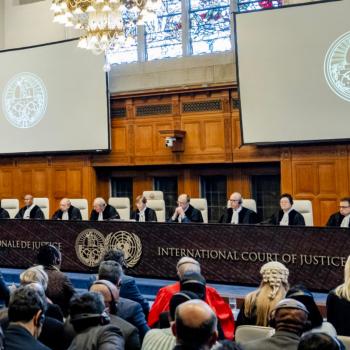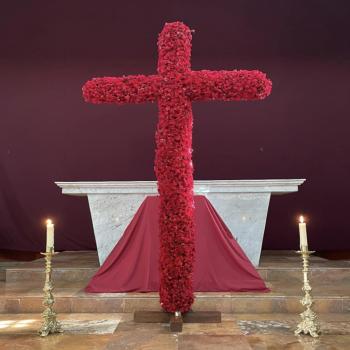Lectionary Reflections
Isaiah 11:1-10
Second Sunday of Advent
December 8, 2013
We are now well into Advent, and Isaiah is once again painting his grand canvases of what the world of YHWH will be like "on that day." There is always danger when we read these texts, because they are overly familiar. To quote Meredith Wilson's musical, The Music Man, the words too often "slip along softly in the tonguest way." This means that we mouth them well, but fail to appreciate what they may have meant to the ancients and what they still might mean for us. In the musical, Gary, Indiana is that meaningful city name, a name that conjures home and joy and peace. Can we sense and express the same thing to jaded 21st-century Christians about what God has in store for us again in this holy season? Unfortunately, Gary, Indiana is known today more for its smog-enshrouded industrial skyline than its evocations of home and joy. Have Isaiah's images become clouded for us today, too, as we gaze out at our world, for many more dashed than realized with hope?
When this text was written has long been the source of much ink and many bites. It rests in the midst of 8th-century Isaiah, the prophet wrestling with kings of Judah hardly worth the name, facing an ever-encroaching Assyrian colossus. What would prick Isaiah to compose such words of hope and idyllic promise? It strikes me as not at all unlikely that words such as these would flow from a prophet plainly fed up with the pathetic attempts at leadership he witnessed from the king and his court in Jerusalem. He dreamed of something far better, and imagined that YHWH had that better in mind.
"A shoot will burst forth from the stump of Jesse, and a branch will surge out of his roots" (1:11). Isaiah begins his vision with a return to the old idea that the kings of Israel and Judah must, by divine decree, always be directly descended from the great David, the king by which all others are to be measured. Isaiah speaks his word some two hundred years after the death of David, and presumably does not reckon with that king's dreadful depredations, recorded in grotesque detail from 2 Samuel 11 through 1 Kings 2. Any reading of those horrifying tales of Israel's second king might suggest that the very last thing Judah needed was another king like that, or at the very least might put the reader off her lunch! Apparently by now, David has become the very model of kingship, and Isaiah promises that God will once again act by bringing from Jesse, David's father, another shoot, one more branch. On the other hand, perhaps not. It could be that the prophet harkens back not to David himself, but the king's father, precisely to suggest that in some sense he does not envision another David at all, but rather a new and better David, a significant improvement on the first model yet still arising from the same stump, thus fulfilling YHWH's early promise of a line of kings from Jesse (see 2 Samuel 7 for the rationale for this belief).
This new branch will have the requisite qualities from YHWH that will promise at last a kingship worthy of its name. "The spirit (ruach) of YHWH will rest on him, a spirit of discerning wisdom, a spirit of tenacious counsel, a spirit of a fearsome knowledge of YHWH" (Is. 11:2). As you can see, I have read these famous lines rather differently than they are usually read. In Hebrew, as in Greek, there is a grammatical structure known as hendiadys, where two nouns are joined together with the very simple connector "and." In such a case one of the nouns may be seen to modify the other, playing the role of an adjective, perhaps as a means of strengthening the central idea being conveyed. Hence, here I suggest that this new shoot of Jesse will possess extraordinarily discerning wisdom, and unbending counsel (the word means "warrior-like"), and a truly fearsome knowledge of YHWH. By "fearsome" I do not mean terrifying but rather mighty (the word means something more like "awe"). In short, this new shoot will fulfill the call of the coronation Psalm 72 that prays that the new king will "judge the people with righteousness and the poor with justice" (Ps. 72:2). At last, calls Isaiah, such a king will come, though his like has yet to be seen in the land.
Echoing that psalm, Isaiah promises that "his delight will be (only) in the awe of YHWH," (because) "he will not judge by what his eyes see or decide by the hearing of his ears; (instead) with righteousness he will judge the poor and decide uprightly for the meek of the earth" (Is. 11:3-4a). This new king will not rely on traditional ways of judgment, but will go far beyond his predecessors, bending over backward on behalf of the poor and the meek, making certain that justice is offered to them, despite those who would deny it to them. Plainly, Isaiah claims that kings too often have offered so-called justice to those who, like them, are rich and powerful. This new king will be different in every way.





